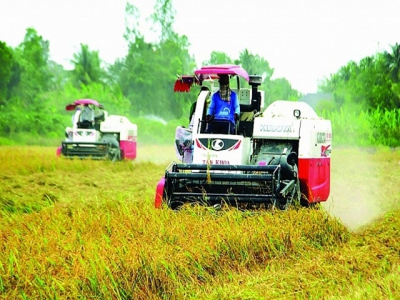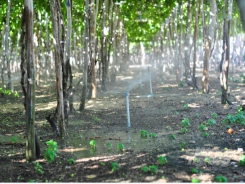Avoiding breaking the chain of agricultural production, processing and consumption

Production, processing and consumption of agricultural products are still facing challenges and many difficulties. Unblocking obstacles requires high flexibility and initiative in each locality as well as close coordination from ministries and branches.
The situation of rice consumption in the Mekong Delta has become better because the provinces actively remove difficulties for firms, traders to promote purchasing, but it still faces certain difficulties. Photo: Nguyen Thanh
Facing difficulties anywhere
Tan Cang Freight Forwarding and Unloading Agent Joint Stock Company receive rice packing service at wharf 125 in Tan Cang - Cat Lai port area, with a scale of two dual conveyor belts, with a capacity of 70 containers per day. Simultaneously, the implementation of "three on spot" is ensured, workers are tested regularly, which supports firms to pack export goods at the port.
In addition to packing rice for export directly at Cat Lai port, Saigon Tan Cang Corporation also develops other facilities in the system that can meet option of “3 on spot” and container-packing activities, along with good support policies for rice packing workers such as: ICD Tan Cang - Nhon Trach, Tan Cang port - Hiep Phuoc, with a capacity of 20-25 containers per day each facility and Tan Cang - Cai Cui in the Mekong Delta, with capacity from 13-15 containers per day. The release of rice exports for firms in the current difficult time helps reduce output pressure for export agricultural products, ensuring a smooth supply chain of essential goods domestically and internationally.
According to the latest information from the Working Team on directing production, connecting the supply and the consumption of agricultural products in 19 southern provinces and cities amid the Covid-19 pandemic (Working Team 970), the Ministry of Agriculture and Rural Development, reports from provinces sent to Working Team 970 and information from the Ministry of Industry and Trade showed that recently, the price of fresh rice in the Mekong Delta provinces tended to increase again after a deep decrease at the end of July. Rice consumption in the Mekong Delta was better because the provinces removed it for firms and traders to promote purchasing.
Nguyen Tan Nhon, Deputy Director of the Department of Agriculture and Rural Development of Can Tho province, said at present, the whole city had 26/45 rice exporting firms operating, but only produced 50% due distancing must be ensured. In the warehouses of firms, there were still 64,000 tonnes of rice, 217,000 tonnes of rice. “Currently, the Mekong Delta provinces still applied Directive 16, so the process of sending people to other provinces to buy rice is difficult. Due to the different procedures of each province, it is recommended that the Ministry of Agriculture and Rural Development consult with the Ministry of Transport to guide provinces issue licenses for river transportation like road transportation; at the same time, provinces must give priority to vaccination for rice harvesters,” Nhon emphasised.
Le Thanh Tung, Deputy Director of the Bureau of Crop Production (MARD), Deputy Head of Working Tram 970 said the situation of seafood processing and export continued to face difficulties. The number of seafood processing firms for export in the southern region temporarily suspending production was 123 establishments. The number of establishments with Covid-19 cases that had to stop production was 19 and 104 establishments stopped production because they did not meet the requirement of “three on spot”. Thus, 326/449 establishments in 19 southern provinces and cities continued to produce accounted for 65%.
“Due to the lack of workers and split shifts to prevent pandemics, the total capacity is only about 30-40% compared to before the application of Directive 16. Because HCM City and other provinces have extended the distance after August 15, 2021, seafood processing firms will face more difficulties due to the cost of “three on spot” is very high. This situation will affect the entire seafood production and business chain,” said the leader of the Bureau of Crop Production.
Total force to remove
Working Team 970 assessed the current situation of agricultural product circulation, as well as the travel of the agricultural labour force in traffic routes like national highways and provincial roads among provinces and with HCM City, has become stable. However, in some localities, inter-village and inter-commune roads with the control of local forces have not yet updated the general direction, causing some difficulties in travel for the labour force, firms, farmers in the production and circulation of agricultural products and commodities.
Deputy Minister of Agriculture and Rural Development Tran Thanh Nam said Mekong Delta provinces currently had 690,000 hectares of summer-autumn rice, which harvested from now to mid-September. The rice harvest, especially for summer-autumn rice, could not be delayed as in the rainy season, the rice seeds would sprout on the cotton and become damaged. Therefore, transporting and bringing workers and harvesting machines were very important. Similarly, aquatic products like shrimp and pangasius should not be left in the pond for a long time because they would be too old. Localities need to create conditions for firms and producers to harvest, purchase and transport products quickly.
Working Team 970 proposed the Departments of Agriculture and Rural Development of southern provinces to advise and propose to the Provincial People's Committee to create conditions for workers and machinery to harvest rice and firms to carry out activities of purchasing, transporting, milling and processing and consuming rice favourably under compliance with local regulations on pandemic prevention. “In addition, strengthening forms of production linkages, forming raw material areas, connecting supply and demand of all key local agricultural products, linking agricultural harvests to actively supply and limit the phenomenon of oversupply at some times of the year, rice in particular in 2021,” said Tung.
At an online meeting, a representative of the Traffic Police Bureau (Ministry of Public Security) emphasised that provinces and cities did not set up checkpoints or stop vehicles on arterial roads such as National Highway 1. Provinces and cities only stop vehicles at checkpoints in their area.
For trucks carrying agricultural products from the southwest to the border provinces for export, the transportation time is long, and there is no contact on the road as many provinces are implementing social distancing. Therefore, a representative of the Traffic Police Bureau said the validity period of Covid-19 test certificates should be extended for long-distance drivers, and there were Covid-19 rapid test points on major national highways across the country.
Deputy Minister Tran Thanh Nam said “Spirit is to remove difficult anywhere. The Departments of Transport, Departments of Agriculture and Rural Development, Departments of Health in each locality coordinate to implement, if there are still problems, they should propose to the Provincial Steering Committee for Covid-19 Prevention and Control to remove them. For inter-regional issues across the country, it is recommended to propose to the Working Team of the ministries to have appropriate solutions, to avoid reporting much to the Prime Minister.”
Minister of Agriculture and Rural Development Le Minh Hoan said no regulation covers every corner of life and localities need to be more proactive.
“For example, localities raise the issue of 'green channels' on waterways, in my opinion, it should not wait for the decision of the Ministry of Transport as there are already 'green channels' on roads, on this principle, localities can build a 'green channel' on the waterway.” For the problem of not accessing to capital in commercial banks, localities must also clearly see that banks had been afraid of precarious agricultural production, adding disease affecting production. If provincial leaders did not have specific dialogues with banks, it would be difficult to access capital, he said.
According to Minister Le Minh Hoan, this was also the time when Mekong Delta provinces must have a deep thought about the agricultural economy, not just agricultural production. If the price of rice was too low, it was also necessary to calculate a plan to reduce the rice area to replace other efficient crops. The achievement of export output can’t be exchanged for the risk for farmers.
Có thể bạn quan tâm
Phần mềm

Phối trộn thức ăn chăn nuôi

Pha dung dịch thủy canh

Định mức cho tôm ăn

Phối trộn phân bón NPK

Xác định tỷ lệ tôm sống

Chuyển đổi đơn vị phân bón

Xác định công suất sục khí

Chuyển đổi đơn vị tôm

Tính diện tích nhà kính

Tính thể tích ao hồ



 Ensuring a successful autumn-winter crop
Ensuring a successful autumn-winter crop  Economical irrigation, solution for sustainable agricultural development in…
Economical irrigation, solution for sustainable agricultural development in…